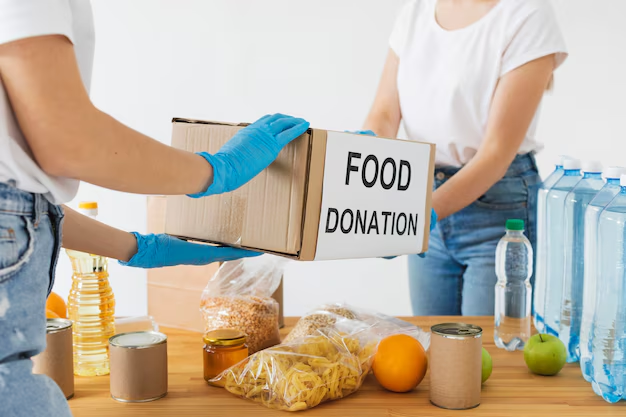Finding Your Next Food Bank Distribution: A Comprehensive Guide to Accessing Essential Resources
In times of economic uncertainty and personal financial challenges, knowing when and where to access food bank distributions can provide crucial support for individuals and families in need. While food banks help bridge the gap, questions about their services, especially regarding the timing of distributions, are common and understandable. This guide will explore everything you need to know about finding out when the next food bank distribution is happening and offer related insights into maximizing these invaluable resources.
Understanding Food Bank Operations
Food banks serve as key resources for those seeking food assistance. Understanding how they operate can empower you to utilize them effectively.
How Food Banks Work
Food banks often function by collecting surplus food from retailers, manufacturers, and donations to distribute to those in need. These institutions vary from community to community, with each having its methods and frequency for distribution.
Types of Food Assistance
- Local Food Pantries: Often supported by larger food banks, these pantries distribute food directly to individuals and families.
- Mobile Pantries: These services extend the reach of food banks by traveling to underserved communities.
- Special Programs: Some offer additional services such as senior food boxes or nutrition education workshops.
How to Find the Next Food Bank Distribution
Finding out when and where food distributions will occur can seem daunting, but several strategies and tools can make it easier.
Direct Contact and Online Resources
Given that food bank schedules can be subject to change, here are some effective ways to stay informed:
- Visit Your Local Food Bank's Website: Most food banks have websites with updated information on distribution schedules.
- Call Directly: Don't hesitate to reach out to food banks directly through their contact numbers.
- Social Media: Many organizations announce distributions and updates through platforms like Facebook and Twitter.
- Community Centers and Churches: Often partners with food banks, these centers might have distribution schedules available.
Utilizing National Resources
- Feeding America: As a network of food banks, their website allows you to search for local distributions based on your zip code.
- Local Government Websites: City or county health departments frequently list resources for food assistance.
Factors Influencing Distribution Schedules
Distribution times and days can vary based on several factors, of which you should be aware to plan effectively.
Supply Chain Considerations
Food availability may impact schedules. During times of high demand or supply chain disruptions, some banks may need to adjust their times.
Volunteer Availability
Food banks rely heavily on volunteers. Changes in volunteer availability can occasionally affect operational hours.
Seasonal Variations and Holidays
Holiday periods often see increased distribution to meet heightened demand. Many food banks provide special holiday boxes with additional items.
Practical Tips for Making the Most of Food Distributions
To maximize the benefits of visiting a food bank, consider these practical tips:
Preparing for Your Visit
- Arrival Time: Arrive early to ensure you receive the full allocation of supplies.
- Documentation: Check if you need to bring any documents such as proof of residence or identification.
- Bags/Containers: Some food banks require you to bring your own bags or boxes.
Making the Most Out of What You Receive
- Plan Meals Ahead: Review the items you receive and creatively plan meals.
- Storage Solutions: Ensure you have adequate storage, keeping perishables in appropriate conditions.
💡 Quick Access Tips
Here's a summary of useful strategies to ensure you never miss a food bank distribution:
- 🔍 Check Online: Regularly visit food bank websites and follow their social media.
- 📞 Contact Local Pantries: Direct calls can provide immediate schedule updates.
- 📝 Subscribe to Alerts: Some banks offer newsletter subscriptions for timely updates.
- 🗓️ Community Boards: Notices often posted in libraries or town halls.
Navigating Challenges and Maximizing Benefits
The journey toward accessing food bank services can come with its own set of challenges. Here's how to navigate them:
Addressing Stigma and Anxiety
It’s not uncommon to feel hesitant about seeking help. Remember, food banks exist to support individuals and families facing short-term or long-term food insecurity. These organizations are dedicated to creating a welcoming and judgment-free environment.
Understanding Your Rights
When you visit a food bank, understanding your rights can ensure you have a dignified experience:
- Right to Respect: You should always be treated with dignity and kindness.
- Privacy and Confidentiality: Your personal information should be handled with confidentiality.
Building Community Connections
Forming relationships with other food bank users and volunteers can enhance your support network and provide even more benefits and resources.
Looking Beyond Food Assistance
Food banks are often starting points for broader community support.
Additional Services and Programs
Many food banks collaborate with other community organizations to offer holistic support:
- Nutrition and Cooking Classes: Learn to make the most of what you receive.
- Job Assistance Programs: Connections to employment services can help improve personal circumstances.
- Health Screenings: Periodically offered at some locations for comprehensive wellness support.
Empowering Yourself and Others
Utilizing the resources offered by food banks is an empowering step toward self-sufficiency. Sharing your positive experiences can motivate others to seek help when needed, galvanizing support networks within your community.
A Continuous Commitment to Support
Ultimately, the goal of food banks is to alleviate food insecurity. With community involvement, growing awareness, and continuous support, these organizations work tirelessly to provide consistent and reliable help. Engaging with food banks, whether receiving services or volunteering, contributes significantly to community strength and resilience.
In conclusion, finding the next food bank distribution involves a combination of proactive search, understanding available resources, and leveraging connections within your community. With these strategies, you can access vital food assistance efficiently and with dignity, ensuring your family’s needs are met while exploring paths toward greater stability and empowerment.

Related Topics
